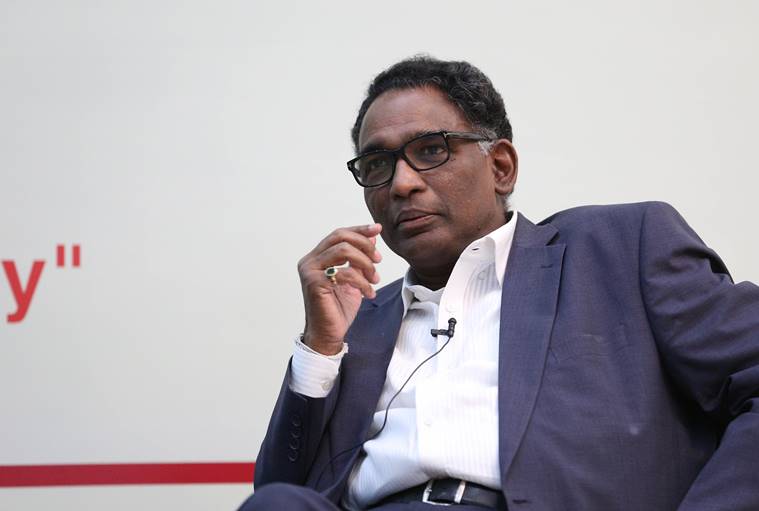 Justice J Chelameswar, the Supreme Court Judge, in conversation with Journalist Karan Thapar on “Role of Judiciary in a Democracy” in New Delhi on Saturday. (Express Photo By Amit Mehra)
Justice J Chelameswar, the Supreme Court Judge, in conversation with Journalist Karan Thapar on “Role of Judiciary in a Democracy” in New Delhi on Saturday. (Express Photo By Amit Mehra)
Justice J Chelameswar, the Supreme Court judge who found himself at the helm of a rebellion against Chief Justice of India (CJI) Dipak Misra three months ago, on Saturday stated that he shall not be seeking any employment from the government following his retirement. In a programme organised by Harvard Club of India- an association of alumni from the famed American university, he said: “I am saying it on record that after my retirement on June 22, I will not seek any appointment from the government.”
The Supreme Court judge also voiced his views on whether impeachment of judges is a credible solution to eradicate the inherent problems of the judicial system in this country. He said that impeachment cannot be an answer to every question or problem and there is a need to correct the system. The senior judge’s response on impeachment comes at a time when certain opposition parties are vying to initiate impeachment proceedings against CJI Dipak Misra.
“Impeachment can’t be the answer for every question or every problem. A few days ago I heard somebody asking for my impeachment. Like the saying goes, I don’t agree with you but I shall protect your right to say so,” he said.
 Justice J Chelameswar who was delivering a talk on the topic ‘Role of judiciary in democracy’, also answered questions on the order of priority of the CJI in constituting benches and allocating cases to different judges as the ‘master of roster’. (Express Photo by Amit Mehra)
Justice J Chelameswar who was delivering a talk on the topic ‘Role of judiciary in democracy’, also answered questions on the order of priority of the CJI in constituting benches and allocating cases to different judges as the ‘master of roster’. (Express Photo by Amit Mehra)
Justice Chelameswar, who happens to be the senior-most judge after the CJI, stated that the January 12 press conference he jointly addressed along with justices Ranjan Gogoi, M B Lokur and Kurian Joseph was held owing to the ‘anguish’ and ‘concern’ arising from the failure of their deliberations with the CJI Misra which according to him, did not yield the solution on the issues raised by them regarding the functioning of the apex court.
Justice J Chelameswar, who was delivering a talk on the topic ‘Role of judiciary in democracy’, also answered questions on the order of priority of the CJI in constituting benches and allocating cases to different judges as the ‘master of roster’.
“The CJI is the ‘master of roster’. Undoubtedly, the CJI has this power. The CJI has the authority to constitute the benches but under constitutional system every power is coupled with certain responsibilities. The power is required to be exercised not because it exists but for the purpose of achieving public good. You don’t exercise the power merely because you have it,” he said. He replied in affirmative when asked whether he was of the opinion that the power of setting up benches and allocation of cases should not be exercised arbitrarily.